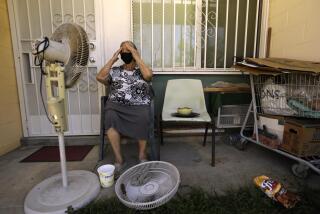Inside tips on filtering out air pollution
- Share via
There are steps homeowners can take to reduce exposure to automotive pollution.
“Simple things ... would lead to modest improvements,” said William Nazaroff, a professor of mechanical engineering at UC Berkeley who specializes in air filtration. A room-size air filter, for example, could be used in a bedroom at night to reduce particle pollution. Or a homeowner could hire a contractor to install a central air system filter.
A variety of filters can be used, Nazaroff said, including high-efficiency particle arresting filters, commonly known as HEPA filters, and activated carbon filters to remove some exhaust fumes, such as benzene.
To optimize the efficiency of a central air system, the contractor should “pressurize” the house by installing an outside air intake. While it sounds counter-intuitive, bringing outside air into the home prevents polluted air from leaking in under doors and through cracks around windows, said J. Michael Burke of Burke Environmental Inc. in Inglewood. The air inside is then continually filtered while the central blower fan operates.
Burke, who has served on numerous technical committees for the American Society of Heating, Refrigerating and Air-Conditioning Engineers, said that new controls on central air systems can run the blower fan alone when the furnace burner or cooling system is not needed. This keeps air circulating through the filter and reduces indoor pollution.
A heating and air-conditioning contractor can install a basic central filtering system for as little as a few hundred dollars, depending upon the grade of the filters and any needed controls, Burke said.
The additional electricity needed to filter household air will cost about $30 a month for a 2,000-square-foot house.
“People who are close to a freeway or in a polluted area are advised to have that system running,” he said.
There is long-term hope too. Cars are much cleaner now due to air-pollution control standards, according to the California Air Resources Board, and new standards and cleanup programs are expected to continue to reduce emissions from cars and diesel trucks in the decade ahead.
-- William J. Kelly
More to Read
Inside the business of entertainment
The Wide Shot brings you news, analysis and insights on everything from streaming wars to production — and what it all means for the future.
You may occasionally receive promotional content from the Los Angeles Times.










